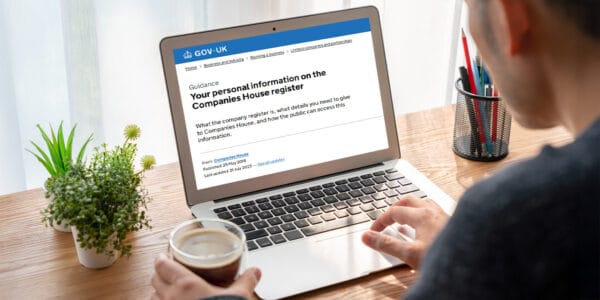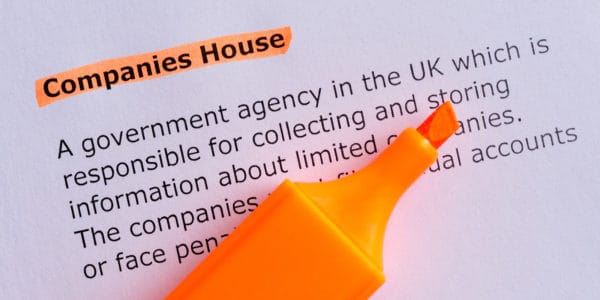When you set up a new limited company or registered partnership here in the UK, you must share some basic information about yourself, like your address and directorship, with Companies House, the UK’s official registrar for all companies and LLPs.
Companies House keeps a lot of that information under lock and key. However, adding some company and personal details to the public register is legally required.
In July 2025, Companies House updated its policy to make it easier to change what’s shared publicly. Read on to find out what changed about company registration in 2025, including privacy changes for UK company directors and how to protect your home address using an address services provider like Quality Company Formations.
Key Takeaways
- When forming a limited company, you must disclose your name, date of birth, occupation, nationality, and address. Companies House then publishes most of this information on its public register.
- Starting in July 2025, you can request that Companies House remove your day of birth, occupation, or signature from public documents on the register.
- Using an address services provider is the best way to keep your home address off the public register.
Changes to the Companies House register for 2025
Companies House has announced policy changes that make removing private details from the public record easier. We’ll break down what those changes mean for you. But first, let’s talk about what the Companies House register is and why it’s necessary.
What is the Companies House public register?
Companies House is the UK government’s official register for all companies and limited liability partnerships, and other corporate entities, in the UK. When you form a new company, it’s Companies House’s job to check and record all the details about you and your business.

Companies House then publishes some of those details online as part of its ‘public register’. Once made live, any member of the public can access basic information about your company’s activities, its annual accounts, and details about who runs your company.
Translation: if you become a company director or shareholder, you must be prepared to have some of your personal details made publicly available.
Traditionally, those personal details include your:
- Name
- Address
- Nationality
- Occupation
- Date of birth
What changed in July 2025?
Companies House has updated its register policy in 2025, enabling company owners and officers to reclaim added privacy when forming a limited company. It is now easier to remove even more details.
Which personal details can be removed?
For the last decade, the day of a person’s date of birth has been suppressed for new submissions. This means only the month and year of birth were made visible. However, if the date of birth was submitted before 10 October 2015, the day would still be visible on the historical filings. This historical information can be easily removed, so only the month and year are visible.
In addition to requesting your day of birth be taken off the register, July’s policy update also lets company directors or officers apply to have their business occupation and signature removed from documents published online.
What remains on the public register?
You can now apply to remove the day of your occupation, signature, and home address from the public register. However, there is some information that Companies House cannot remove. This includes your:
- Full legal name
- Month and year of birth
- Nationality
- Service address (unless your home address was used for this)
This information must remain public to ensure compliance with existing company law and preserve the UK’s sterling reputation as a transparent business environment.
What personal details do you need to share when forming a limited company?
Registering a limited company through Companies House requires you to provide some basic information about yourself and your business.
To help you stay organised, we’ve broken that information down by type:
Company information
Regarding the company itself, you’ll need to provide Companies House with several things, including:
- A full registered office address (P.O. boxes won’t be accepted)
- Details about your business activity (SIC code)
- Single alternative inspection location (SAIL) address
Director and shareholder requirements
You’ll also need to record details about your company directors, shareholders, and company secretary (if you choose to appoint one).
Forming a company by yourself? Don’t worry: A single individual can act as both a company director and shareholder.
Regardless of who you’re appointing to these positions, you must tell Companies House each director’s:
- Title (Miss, Mrs, Mr, etc.)
- Full legal name
- Date of birth
- Occupation
- Nationality
- Residential address (private)
- Service address (public)
What’s the difference between a residential address and a service address?
By ‘residential address’, we’re talking about your usual home address. Companies House does not publish that on the public record.
Your service address is your official correspondence address that Companies House will use to send statutory mail. This address is made public. Fortunately, you’re free to choose whatever address you want for this, so you can choose to use a Service Address service from a third-party provider, like Quality Company Formations. By doing so, you won’t need to use your home address, thereby keeping it out of the public domain.
What personal details will and won’t appear on the public register?
As we’ve already pointed out, your full date of birth won’t be published on the public register. Companies House will only share your full date of birth if required by law. This might include passing your details on to credit reference agencies or the police. The same rule applies to your home address.
Subscribers (the first shareholders) need to provide Companies House with the following personal details, in addition to information about their shareholding:
- Full name
- Service address
You’ll also need to give Companies House three security details for each shareholder. These act as an online signature and won’t be made public. They include details like the first three letters of your mother’s maiden name or the first three letters of your town of birth.
Note: Any shareholder joining the company after incorporation will only be required to provide their name and details of their shareholding.
Person of Significant Control (PSC) disclosures
All companies are required to report their People with Significant Control (PSC).
A PSC is someone who owns or controls a UK company. They’re also sometimes called ‘beneficial owners’. Although there are various ways a person can be considered a PSC, most become one because they are shareholders controlling a large proportion of the company’s shares.
Disclosing information about PSCs is legally required to preserve business transparency in the UK. Failure to do so is a criminal offence. You could face a two-year prison sentence, a fine, or both.
You must submit personal information about the Person with Significant Control:
- Full name
- Date of birth
- Nationality
- Residential address
- Service address
In addition, you will need to report the PSC’s nature of control over the company. In other words, what makes them a PSC. In simple terms, this is a set of conditions of which you’ll need to select those that apply. For example, holding “more than 25% but not more than 50% of the company’s shares”.
Most of this information must be made available to the public by law. However, Companies House’s policy update in July lets you apply to have some of it removed from the record. The application process is very straightforward.
How to remove your personal information from the Companies House register
If you’re concerned about protecting your privacy, you can apply directly to Companies House to remove your date of birth, occupation, or signature from the public register.
Applying to remove your home address is possible, but more complicated. Taking these steps helps you register your company securely and limit your exposure on the public record.
First, let’s start with the easy stuff. To remove a day of birth, occupation, or signature, you’ll need to complete the Form SR01 ‘Application to remove personal details from the public register’. Complete this form and email it to [email protected]. Alternatively, you can also post the form to the following address:
The Registrar of Companies
P.O. Box 4082
Cardiff
CF14 3WE
In terms of cost, you’re dealing with a variable number. That’s because it costs £30 to remove your personal details from each document. So, if you’d like to remove your signature, day of birth, or occupation from three different documents, you’d have to pay a total of £90. Without the correct payment, Companies House will reject your application.
You can remove your full date of birth or occupation from any Companies House form that appears on the register. But there are a couple of extra rules around your signature.
You can’t have your signature removed from an order imposing a charge, instrument, deed, or debenture delivered under mortgage provisions. That’s because these essential legal documents must remain verifiable for transparency.
It’s also important to remember that removing your signature doesn’t include the removal of your printed name. This will stay on the record no matter what.
Why might your home address be on the register?
If you used your residential address for your service address or your company’s registered office address when registering a company online, a standard error – this section is for you. When registering a limited company without support from an experienced agent like Quality Company Formations, it’s often instinct to enter your own home address as your company’s new address. Unfortunately, that means your personal address will end up on a lot of public documents.
Alternatively, it might be because you sent your home address to Companies House before 10 October 2015. Before this date, all home addresses were recorded publicly, even if you also used a service address. So, if you’ve had your company for a long time, there may be documents that are easily locatable with your home address on them.
When can you apply to remove your home address?
You can apply to remove your home address from the public register if you listed your home address as your service address or the company’s registered office. But there’s a catch: If you still hold an active position in the company, you’ve got to provide an alternative address to replace the one you’d like removed. This applies if you’re a company:
- Director
- Secretary
- PSC
- LLP member
Likewise, suppose your current home address doubles as your limited company’s registered office address. In that case, you’ll need to change the company’s registered office address before applying to have your home address taken off the register. And if your company has been dissolved, you’ll need to wait six months before applying to remove your registered office address.
It’s also essential to bear in mind that Companies House cannot remove your home address if it’s:
- Subject of a mortgage charge
- Part of a company’s name
- A current registered office address
How to replace your home address and submit your request
Assuming none of these conditions apply, you can request to have your home address removed from the public register by completing Form SR01 and submitting it to Companies House via email or post. If you are replacing the home address (when it has been used as a service address), you’ll use this form to provide the new address to take its place.
Just remember to think carefully about the address you’re choosing to replace. Using an address services provider like Quality Company Formations is the most convenient solution if you want to keep your home address private.
Our Directors’ Service Address package enables you to use our prestigious Covent Garden office address as your statutory service address, keeping your home address off the Companies House register.
Want to find out more? Check out our Address Services Guide.
It walks you through each type of address you must document when forming a company, including:
- Why it’s required
- Where that address is published
- How you can protect your privacy using professional address services
Useful forms
- Form SR01: Apply to remove your personal details from the Companies House register
- Form OS SR01: Application under regulation 25 application by an individual
- Form OS SR02: Application under regulation 25 application by an overseas company
It’s time to form your company
When registering a limited company or partnership here in the UK, submitting the correct information to Companies House is critical. But you should also be aware of your rights to remove information or change it later.
That’s why partnering with an experienced company formation agent like Quality Company Formations pays off. With our privacy-led formation packages, you can protect your details from day one and form your company in as little as 24 hours. Ready to register your business? Let’s get started.
Please note that the information provided in this article is for general informational purposes only and does not constitute legal, tax, or professional advice. While our aim is that the content is accurate and up to date, it should not be relied upon as a substitute for tailored advice from qualified professionals. We strongly recommend that you seek independent legal and tax advice specific to your circumstances before acting on any information contained in this article. We accept no responsibility or liability for any loss or damage that may result from your reliance on the information provided in this article. Use of the information contained in this article is entirely at your own risk.















Join The Discussion